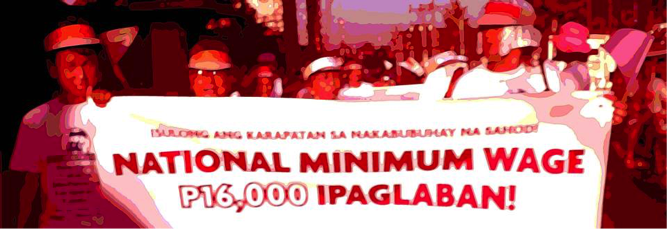Labor Rights Group Says NMW Can Bring Relief to Working Poor

The Center for Trade Union and Human Rights welcomed the labor department’s announcement that it is considering a national minimum wage (NMW) law to ease “overpopulation” in Metro Manila. CTUHR reacted saying a higher national minimum wage will not only stem internal migration in the country but can also significantly bring relief to the working poor especially in the provinces.
“A national minimum wage can also discourage runaway shops and extreme exploitation to workers in the provinces,” CTUHR Executive Director, Daisy Arago said.
The group stressed that since the implementation of the Wage Rationalization Act of 1989 and the neoliberal restructuring of the global economy, many business enterprises owned by transnational companies such as factories in economic zones, mining and agricultural plantations as well as business process outsourcing, have exploited and profited much from cheaper labor costs in regions outside the NCR as a result of the country’s regionalized wage system.
At present there are over 1000 minimum wage rates in country public and private sector combined. In the private sector, wage rates vary across region and industry. The national capital region has the highest minimum wage rate at P481 a day. Minimum wage rates in other regions range from P230 to P380. Meanwhile, about one out of five people below the poverty line are considered working poor.
“However, a national minimum wage must not result in wage cuts but instead bring wage rates closer to living standards. At present, Metro Manila wage rates only comprise 44 percent of the P1,089 estimated family living wage. So, when workers demand a national minimum wage, it effectively means two things: a national wage rate and a significant wage increase,” Arago averred.
CTUHR stressed that since 2014, the workers have been demanding, a national minimum wage of P750 daily or P16,000 monthly. “It is just and it is feasible as studies have shown. If the Duterte government is serious in addressing poverty and inequity, a national wage that approximates the living wage is one of the things it can do. Ending labor contractualization is another positive step,” Arago added.
“We look forward that these pronouncements bring about actual results and changes for the workers. For sure, capitalists and businessmen will try to block policy changes that might affect their profit. It remains a challenge then for the Duterte administration to live up to its words and a greater challenge for the workers to further organize and amplify demands to effect change.” Arago explained.###
